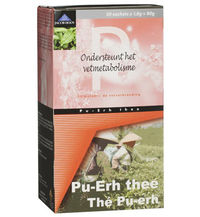Pu-erh Tea
Pu-erh tea, also spelled as Pu'er tea, is a variety of fermented dark tea produced in Yunnan province, China. Fermentation is a tea production style in which the tea leaves undergo microbial fermentation and oxidation after they are dried and rolled. This process is a Chinese specialty and produces tea known as Hei Cha (黑茶), commonly translated to dark, or black tea (this type of tea is completely different from what in West is known as "black tea", which in China is called "red tea"). The most famous variety of this category of tea is Pu-erh from Yunnan Province, named after the trading post for dark tea during imperial China.
All teas made from the tea plant (camellia sinensis) possess health benefits because they contain polyphenolic compounds. Pu-erh tea possesses all the chemical constituents in green, white, Oolong and black tea.
See also :
Special Precautions of Pu-erh Tea
See : Black Tea
The benefits of Pu-erh Tea are
What is unique about Puerh tea and separates it from other teas, is Pu-erh is made from a broadleaf variety that promotes microbial activity that results in a tea that is believed to have medicinal benefits, including antifungal, anti-inflammatory and antimutagenic properties, as well as the ability to suppress fatty acid synthesis, which is associated with weight loss and the prevention of cardiovascular diseases.
The chemical composition of broadleaf varietal tea trees (da ye) grown in Yunnan not only gives the tea a distinctive aroma and flavor profile, it also makes the leaves of Pu-erh tea suitable for aging, enhancing the quality of the tea. Pu-erh starts its life out like a green tea (except it is not dried completely like a green tea). As the tea ages, naturally or artificially, the leaves, which retain a certain amount of moisture, undergo fermentation, which is brought about by the action of various microorganisms. It is the result of this microbial activity that give rise to the unique medicinal qualities Pu-erh tea offers.
Many studies have been conducted to pinpoint the health benefits in Pu-erh tea. An article published in the Experimental Gerontology, June 2009 entitled Pu-erh tea aqueous extracts lower atherosclerotic risk factors in a rat hperlipidemia model suggests, “Pu-erh tea exerts strong antioxidative and lipid-lowering effects and therefore can be used to reduce the risk of cardiovascular disorders.”
A study conducted by the Institute of Biochemistry and Molecular Biology, College of Medicine National Taiwan University, Taipei entitled Pu-erh tea supplementation suppresses fatty acid synthase expression in the rat liver through downregulating Akt and JNK signalings as demonstrated in human hepatoma HepG2 cells reveals, “The expression of fatty acid synthase (FAS) in the livers of rats fed Pu-erh tea leaves was significantly suppressed. The gains in body weight, level of triacylglycerol, and total cholesterol were also suppressed in the tea treated rats.”
Another study done by the Department of Food Science and Technology, China Nan Univ. of Pharmacy and Science entitled, Effects of Pu-erh tea on oxidative damage and nitric oxide scavenging, investigated the effects of fermented Pu-erh tea on oxidative damage and a nitric oxide scavenging agent compared with other brands of tea. The study indicates that “water extracts of Pu-erh tea exhibited a remarkable protective effect in lipid (liposome) and nonlipid model systems, implying that it is an inhibitor of lipid and nonlipid oxidative damage… Overall, these findings suggest that Puerh tea may play a crucial role in preventing such oxidation-related diseases as atherosclerosis and other types of vascular diseases.”
The health benefits of Pu-erh tea have captured the attention of the academic and medical community in recent years. While the evidence has been promising, more exploration is warranted to yield conclusive results. Meanwhile, despite the presence of chemical constituents in tea that are attributable to good health, the ritual of tea brewing, the inhaling of the tea aroma, and the tasting of the fragrance and smoothness of Pu-erh tea is likely to slow-down of your heart rate, calm your nerve, and reduce your stress.
